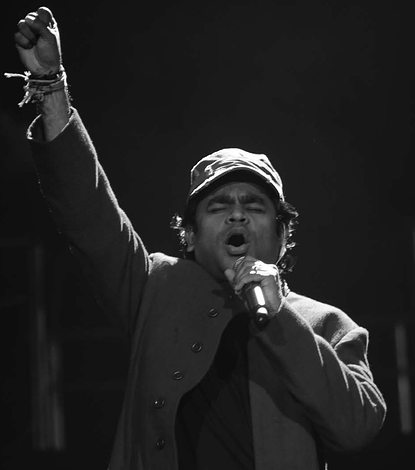-
 Find in Profile
Find in Profile Find in Store Products
Find in Store Products Find in Directory Pages
Find in Directory Pages Find in Classifieds
Find in Classifieds Find in Stores
Find in Stores
- Sign In
- Create Account
Enter Details to Login
Not a Member? Join- Don't have an account? Sign Up
- Already a member? Sign In






 Loading ...
Loading ...
Insert Emoticons 

Insert Emoticons 

 Loading ...
Loading ...A. R. Rahman is an Indian composer, singer-songwriter, music producer, musician, multi-instrumentalist and philanthropist.
Described as the world's most prominent and prolific film composer by Time, his works are notable for integrating Eastern classical music with electronic music sounds, world music genres and traditional orchestral arrangements.
He has won two Academy Awards, two Grammy Awards, a BAFTA Award, a Golden Globe, four National Film Awards, fifteen Filmfare Awards and thirteen Filmfare Awards South in addition to numerous other awards and nominations.
His extensive body of work for film and the stage earned him the nickname "the Mozart of Madras" and several Tamil commentators and fans have coined him the nickname Isai Puyal (English: Music Storm). In 2009, Time placed Rahman in its list of World's Most Influential People.
The UK based World Music magazine Songlines named him one of 'Tomorrow's World Music Icons' in August 2011. Having set up his own in-house studio called Panchathan Record Inn at Chennai, arguably one of Asia's most sophisticated and high-tech studios, Rahman's film scoring career began in the early 1990s with the Tamil film Roja.
Working in India's various film industries, international cinema and theatre, Rahman is one of the world's all-time top selling recording artists. In a notable career spanning two decades, Rahman has garnered particular acclaim for redefining contemporary Indian film music and thus contributing to the success of several films.
Rahman is currently one of the highest paid composers of the motion picture industry. He is a notable humanitarian and philanthropist, donating and raising money for beneficial causes and supporting charities.
Music Style and Impact

Skilled in Carnatic music, Western classical, Hindustani music and the Qawwali style of Nusrat Fateh Ali Khan, Rahman has been noted to write film songs that amalgamate elements of these music systems and other genres, layering instruments from differing music idioms in an improvisatory manner.
Symphonic orchestral themes have accompanied his scores, occasionally employing leitmotif. In the 1980s, Rahman recorded and played arrangements on monophonic sound, synonymous with the era of his musical predecessors K. V. Mahadevan and Vishwanathan–Ramamoorthy. In later years his methodology changed as he experimented with the fusion of traditional instruments with new electronic sounds and technology.
Rahman's musical interests and outlook stem from his love of experimentation. Rahman's compositions, in the vein of past and contemporary Chennai film composers, bring out auteuristic uses of counterpoint, orchestration and the human voice, melding Indian pop music with unique timbre, forms and instrumentation. By virtue of these qualities, broad ranging lyrics and his syncretic style, the appeal of his music cuts across the spectrum of classes and cultures within Indian society. His first soundtrack for Roja was listed in Time's "10 Best Soundtracks" of all time in 2005. Film critic Richard Corliss felt the "astonishing debut work parades Rahman's gift for alchemizing outside influences until they are totally Tamil, totally Rahman." Rahman's initial global reach is attributed to the South Asian diaspora. The music producer Ron Fair considers Rahman to be "one of the world's great living composers in any medium".
The director Baz Luhrmann notes
" I had come to the music of A. R. Rahman through the emotional and haunting score of Bombay and the wit and celebration of Lagaan. But the more of AR's music I encountered the more I was to be amazed at the sheer diversity of styles: from swinging brass bands to triumphant anthems; from joyous pop to West-End musicals. Whatever the style, A. R. Rahman's music always possesses a profound sense of humanity and spirit, qualities that inspire me the most." Rahman has introduced the 7.1 technology in south Indian movies to provide better output.
